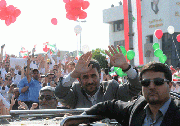
|
| Iranian President Mahmoud Ahmadinejad waves his hands as he greets Lebanese Hizbullah supporters upon his arrival to the main airport road in Beirut, October 13, 2010. Tens of thousands of Lebanese Shia gave Iran’s President Mahmoud Ahmadinejad a tumultuous welcome on Wednesday at the start of a visit which has highlighted Western fears about Tehran’s growing influence in Lebanon. REUTERS/Hussam Shbaro |
Ahmadinejad spent two days in Lebanon, during which he received a hero’s welcome for his continued defiant stance against Israel, which has occupied Lebanon in the past before being driven out in May 2000. Israel also waged war with Lebanon in 2006, but failed to achieve its declared objectives after 33 days of continuous bombing against Hizbullah and civilian infrastructure.
On the second day of the visit, Ahmadinejad visited the southern part of Lebanon, the stronghold of the powerful Hizbullah political party that commands strong loyalties among Shia Muslims in the region.
On Thursday, Ahmadinejad addressed a massive crowd of tens of thousands of people at a stadium in Bint Jbeil, which is a short distance from the Israeli border, and also toured villages bordering Israel that were destroyed during the 2006 war.
The village’s main square, which was reduced to rubble by Israeli strikes in 2006, was adorned with pro-Iranian banners while pictures of overturned Israeli tanks were also posted at the town’s entrance.
Ahmadinejad also visited the village of Qana, a sister city of Dearborn, Michigan, which was shelled in 1996 by Israelis killing 106 civilians seeking refuge at a UN shelter, and bombed again in 2006 during which 56 civilians were killed including 32 children; the attacks were denounced by the UN and Human Rights Watch, respectively, following investigations.
Tanks lined the roads leading to Qana and were stationed beneath Iranian and Lebanese flags welcoming the Iranian president to “the land of resistance,” with heavy security measures imposed during the visit and visitors flocking from all over Lebanon.
U.S. and Israeli officials voiced concerns about a visit they viewed as a provocation, however.
But the tens of thousands of people who watched the Iranian president speak regarded the visit as a seminal moment of defiance in the face of Israeli oppression and aggression in the area, much of which they had experienced first-hand over the last half-century.
Hizbullah supporters also lined the streets of Beirut on Wednesday, waving Iranian flags and showering Ahmadinejad with rice and rose petals as his motorcade made its way from the airport to Lebanon’s presidential palace in Babda, near the capital of Beirut, where he was received by Lebanese president Michael Sleiman and other dignitaries in an official ceremony.
At his news conference alongside Sleiman, the Iranian leader lauded Lebanon’s resistance against the “Zionist regime” and offered his country’s support. He also called for a united Islamic world against the forces of oppression and occupation and called for liberation of the occupied territories of Lebanon, Palestine, and Syria while pinning the instability of the region on Israeli aggression.
Correspondents in the area said that residents, especially in the south, believe Iran’s support has been vital to the country’s rebuilding of its battered civilian infrastructure following the 2006 war. Many also believe that Iran’s support for Hizbullah has been vital in defending against the Israelis.
At a rally in south Beirut later in the day, which also is Hizbullah-controlled, Ahmadinejad sat next to Hizbullah’s deputy commander Naim Qassem as he addressed a boisterous crowd of tens of thousands, many of whom suffered through Israel’s 18-year occupation in south Lebanon.
Hizbullah leader Hassan Nasrallah was not present due to security concerns but he welcomed the Iranian president in a video message.
The rally was not organized by the Lebanese government, however, even though the Iranian president was in the country on an official visit.
Hizbullah currently is in a standoff with Lebanese prime minister Saad al-Hariri over unconfirmed reports that a tribunal backed by the United Nations could indict members of the organization over the 2005 assassination of his father, former prime minister Rafiq al-Hariri.
Ahmadinejad called Saad al-Hariri a “friend and a patriot” at the Beirut rally and said that Western countries are trying to manipulate the media to accuse “friends” (Hizbullah) in order to accomplish their goals in the region. Prime Minister al-Hariri also hosted an official luncheon for the Iranian president at his headquarters.
Iran had approved a $450 million loan for Lebanon to support power and water projects according to Gebran Bassil, Lebanon’s energy and water minister. According to reports, Ahmadinejad said that “all the benefits of his visit would be for all the Lebanese” instead of a single group.
Despite that assertion, members of Lebanon’s pro-Western parliamentary majority said that they were concerned with the visit, however, saying that it was a bid to turn the country into “an Iranian base on the Mediterranean.”






Leave a Reply